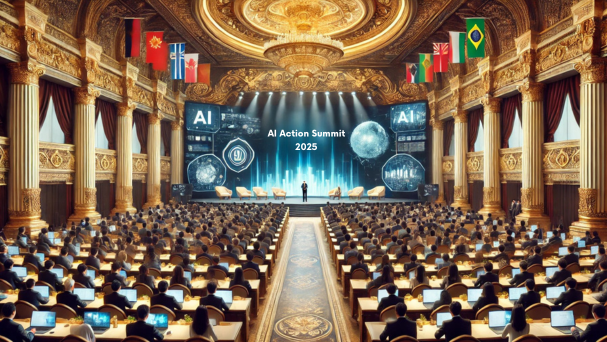India Leads in AI Adoption: Key Takeaways from PM Modi's Address at AI Action Summit 2025
- AI
- February 14, 2025
Key Highlights:
- Introduction
- The Power and Biases of AI
- AI’s Impact on Society and Governance
- Governance Beyond Risk Management
- AI for Global Good
- Addressing Job Disruptions and
- Energy Challenges
- India’s Digital Leadership
- India’s Commitment to AI for Good
- Conclusion
Introduction
Artificial Intelligence (AI) is rapidly transforming the world, and India is emerging as a global leader in AI adoption, innovation, and governance. At the AI Action Summit in Paris, Prime Minister Narendra Modi delivered a compelling speech emphasizing the need for responsible AI development, governance, and collaboration for global good. He highlighted India’s achievements in AI and the steps the country is taking to harness AI for societal progress.
The Power and Biases of AI
PM Modi began his address with a simple yet powerful experiment: AI can interpret complex medical reports in simple terms but struggles to accurately depict a left-handed writer due to data biases. This example underscores both AI’s immense potential and the need for bias-free datasets to ensure fair and inclusive technology.
AI’s Impact on Society and Governance
AI is revolutionizing politics, economy, security, and society. PM Modi emphasized that AI is shaping the code for humanity in this century, making it distinct from past technological advancements due to its unprecedented scale, speed, and global interdependence. This calls for collective global efforts to establish AI governance that upholds shared values, addresses risks, and builds trust.
Governance Beyond Risk Management
Governance should not only mitigate AI-related risks but also promote innovation and accessibility. PM Modi stressed the importance of democratizing AI and ensuring that developing nations, particularly in the Global South, have access to AI resources such as computing power, talent, and funding. This inclusive approach will enable AI to drive sustainable development and bridge technological divides.
AI for Global Good
PM Modi highlighted AI’s role in transforming key sectors such as healthcare, education, and agriculture. AI can accelerate progress toward Sustainable Development Goals (SDGs) by making essential services more efficient and accessible. To achieve this, he called for:
Open-source AI systems for transparency and trust.
Quality datasets free from biases.
Cybersecurity and misinformation countermeasures.
Localized AI applications for maximum effectiveness.
Addressing Job Disruptions and Energy Challenges
The fear of job loss due to AI is widespread, but PM Modi reassured that technological advancements historically shift work rather than eliminate it. He advocated for upskilling and reskilling initiatives to prepare the workforce for an AI-driven future. Additionally, he acknowledged AI’s high energy consumption and the need for sustainable AI models powered by green energy, citing India and France’s longstanding collaboration in renewable energy.
India’s Digital Leadership
India has successfully built a robust digital public infrastructure serving over 1.4 billion people at a low cost. The country’s AI mission is built on an open and accessible network, regulatory frameworks, and applications that modernize the economy and governance. Key initiatives include:
The Data Empowerment and Protection Architecture (DEPA) to unlock data potential.
AI-driven solutions for public good and digital commerce democratization.
Development of India’s own large language model.
A unique public-private partnership to provide affordable compute power for startups and researchers.
India’s Commitment to AI for Good
Under India’s G20 presidency, a global consensus was reached on using AI responsibly for the benefit of all. India’s leadership in AI adoption, legal frameworks, and public-private collaborations position it as a major player in the AI revolution. PM Modi reaffirmed India’s commitment to sharing its AI expertise and experience to ensure a future where AI serves humanity responsibly.
Conclusion
As the world stands at the dawn of the AI age, PM Modi’s message was clear: while AI’s intelligence may grow, the responsibility for its ethical and beneficial deployment lies with humans. India is poised to lead this transformation, ensuring AI development aligns with inclusivity, sustainability, and innovation. The future of AI is not just about technology—it’s about people, values, and a shared vision for a better world.


















